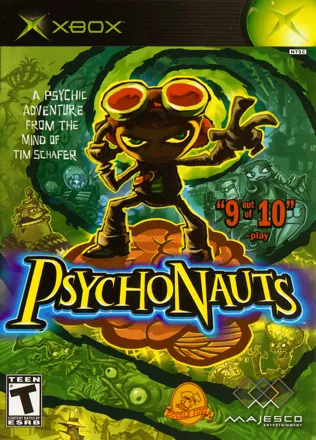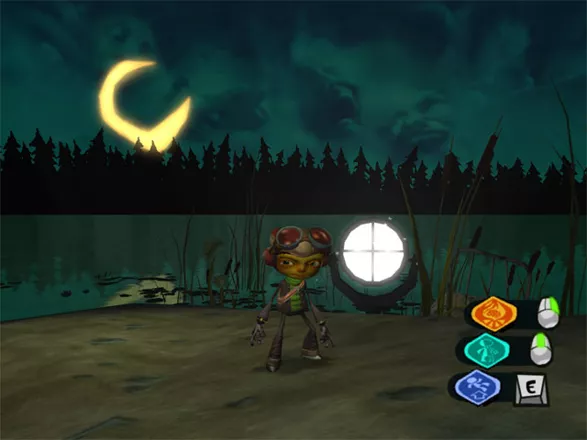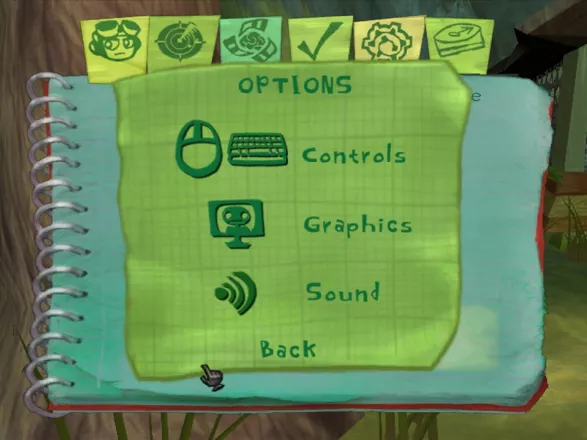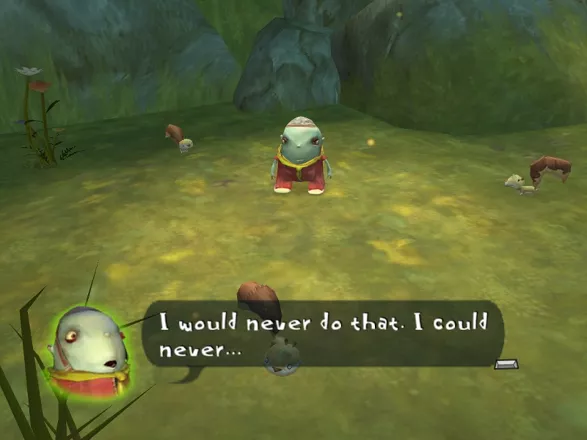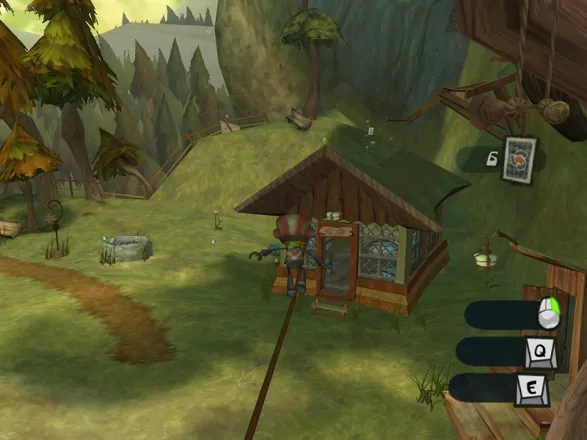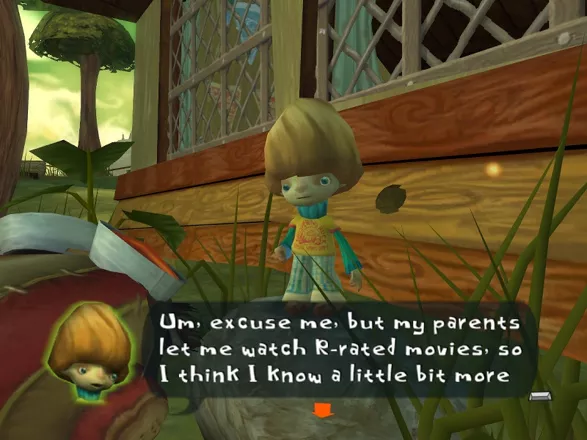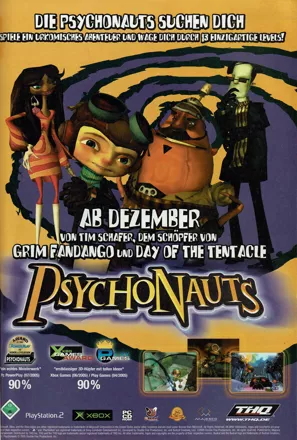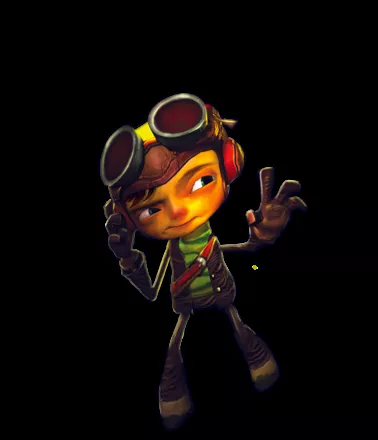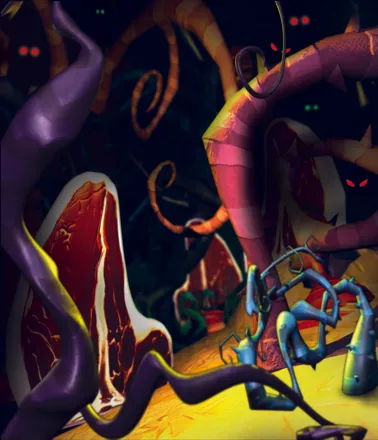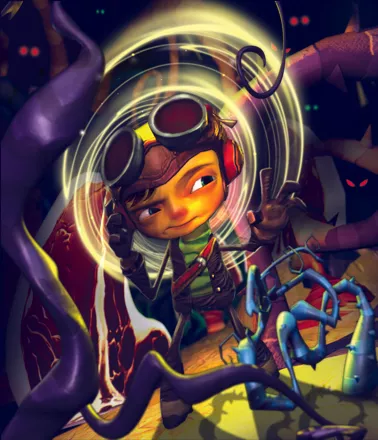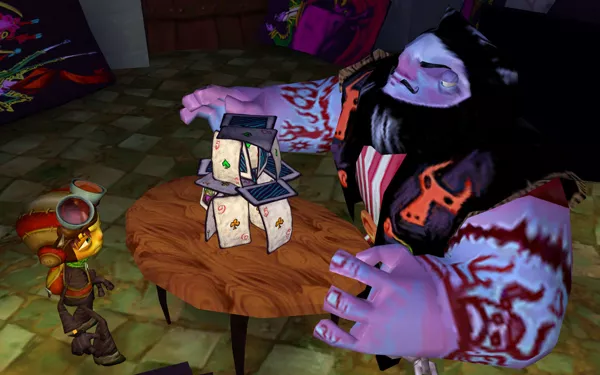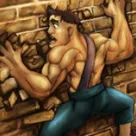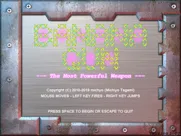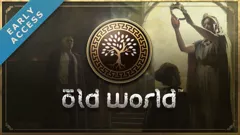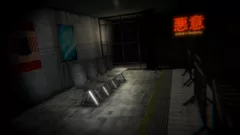Psychonauts
Description official descriptions
At a summer camp for up-and-coming psychics, a young boy with an unusually high level of psychic ability inexplicably shows up. The boy, named Raz, is allowed to stay at the camp until his father comes to pick him up, but his arrival coincides with very strange circumstances. Soon, evidence that someone is psychically tampering with the campers' minds reveals itself, and Raz is the only one who can stop it. Raz must project himself into the psyches of several different people in order to figure out what is going on and who is behind the recent occurrences.
Psychonauts is a 3D platform game with a rather unorthodox style. The characters' inner worlds are the game's levels. Each world reflects the personality of the person whose psyche it represents, often resulting in unique, surreal creations, and influencing the gameplay style. For example, the psyche of a giant lungfish is presented as a large city populated by fish people, in which Raz himself becomes a giant monster who can destroy entire buildings; the psyche of a mental patient is a huge board game, where Raz has to command armies in order to defeat Napoleon, etc.
There are also many gameplay elements and tasks which are common for all the levels. These include Raz fighting the (not very numerous) regular enemies, defeating level bosses, collecting currency, "figments of imagination" needed to upgrade his powers, and bonus items such as complete sets of the character's memories and others. Many of the game's puzzles require the usage of psychic powers, which Raz obtains in a more or less strict order. These powers range from combat abilities such as Psy Shield to Telekinesis (moving objects without touching them) and Clairvoyance (reading other people's minds).
The camp itself serves as the game's "hub", in which the player can explore, interact with characters, search for secret areas and items, and so on.
Spellings
- 意识世界 - Simplified Chinese spelling
Groups +
Screenshots
Promos
Videos
See any errors or missing info for this game?
You can submit a correction, contribute trivia, add to a game group, add a related site or alternate title.
Credits (Windows version)
257 People (150 developers, 107 thanks) · View all
| Creative Director | |
| Lead Programmer | |
| Art Director | |
| Lead Designer | |
| Animation Supervisors | |
| Lead Gameplay Programmer | |
| Executive Producer | |
| Lead PC Programmer | |
| Senior Graphics Architect | |
| Programming | |
| [ full credits ] | |
Reviews
Critics
Average score: 88% (based on 67 ratings)
Players
Average score: 3.8 out of 5 (based on 247 ratings with 8 reviews)
A not-so great port of a great game. Still enjoyable and worth buying, though.
The Good
Tim Schafer. One of my gaming industry heroes, and the famous creator/co-creator of games like Day of The Tentacle, Full Throttle, and Grim Fandango. When Psychonauts was released, discerning gamers everywhere proclaimed it a masterpiece.
Well, it is. This is a wildly imaginative, hugely varied, very entertaining romp disguised as a platformer. You play Raz, a boy with psychic powers who sneaks into a "psychic summer camp". You get merit badges throughout the game which give you special psychic powers like Telekinesis, Levitation, etc. I won't give away anymore, but the areas in the game are essentially the minds of very quirky individuals, and the developers play this concept to the hilt. I think that this is the only game I've played where every area requires a different type of gameplay. Unlike most games that introduce some core gameplay principles at the beginning and then just crank up the difficulty as you go along, Psychonaut's levels are all very unique, and very well done, despite the variety. You might be playing a wargame by recruiting and moving pieces on a giant board, or you might be rolling and floating Sonic-style inside a disco inferno. It has to be played to be believed.
There's also tons of stuff to do if you like collect-a-thons, and believe me, if you want to collect everything, you'd better have some skills and patience.
The Bad
Well, most all of the bad aspects come from the way this game was ported to the PS2. For one, framerate issues. Some people might find it less obnoxious than I do, but the framerate in the PS2 version tends to fluctuate wildly. The game is still highly playable, but really there's no excuse for this kind of thing in a professional product.
Loading times in the PS2 version are also sub-par. This is not unusual for these kinds of ports, but it's still annoying.
Also, the way the game handles save files is not PS2 optimized. You have to create a 1500KB profile save file that contains 5 save slots. The problem is, you can only use these save slots for the game you're in. If you start a new game, you have to create another massive 5-slot profile. The problem with this is that you never need more than 1 slot, as the game is mostly linear, and does autosaves anyway. Which means that if you live in a three-gamer household like me, there will have to be three massive save files on your memory card, and all each person will ever use will be 1/5 of their save slots. Given that games like Ratchet and Clank can support up to six totally separate game files in a 350KB file, this limitation is a bit silly, and feels like the the porters just used the PC-style save system with no modification.
To be fair to the original developers, an external porting house did the conversion, but this is still the least desirable version of this great game.
The Bottom Line
Psychonauts is truly a great game, and every serious gamer should definitely play it. But unfortunately, for the best experience, you should certainly go with the XBOX or PC versions.
PlayStation 2 · by phanboy_iv (84) · 2008
The Good
The core gameplay (platforming, puzzling, and...uh...adventuring) is very good. Most of the gameplay challenges in the game are fun and satisfying. The puzzles aren't so hard that I got stuck but, at the same time gave me enough of a hard time that solving was satisfying.
The gameplay is woven very well into the level design, one level may be more about platforming, while another might be more about puzzle solving, etc., but each one has enough balance and flair that it still feels like a coherent experience.
The story is not bad. There is a particular plot point towards the beginning that's introduced a little clumsily, and the ending is a little predictable, but, other than that, the story is good and the dialogue is quite funny if you dig odd quirky humor. Unlike a lot of other comedic games, Psychonauts knows how to pull off the serious moments well. The characters come across as well-rounded and real despite the game being anything but real.
The level design is outstanding. Without giving anything away, you'll truly be surprised level to level, the brilliant art direction and architecture the folks at Double Fine have come up with. Saying the levels have some variety would be selling them too short.
The Bad
The controls can be a little slippy sometimes. Sometimes you might try to make a jump and maybe miss a little, and it's not entirely human error, but it's not a huge problem and it's kind of a sticky area because it really depends on what you individually think of the controls.
The load times between each area can get bad. We're talking time-to-take-a-nap bad. This really only happens in the overworld, not the actual levels themselves, so it's more of a small problem then a major one.
The voice acting is spotty. Some characters like Raz the protagonist are really well done. Some characters, though...the actors sound like they just drank a gallon of cold medicine and decided to stand on their heads. In other words, they're in it for an easy paycheck.
The Bottom Line
Psychonauts is a great adventure game with a funny and endearing story and characters, and level design that may challenge you to rethink your opinion of games. A couple of technical issues keep it back from being perfect in my eyes, but to all others, I say jump right in.
PlayStation 2 · by kent c. koopa (19) · 2010
Absolutely stunning... Schafer does it again!
The Good
Where to begin? Well, for starters, this is bar-none the most imaginative game I have ever experienced. Razputin's ability to enter the minds of others to battle their anxieties and insecurities is the perfect pretense to let Tim Schafer and Double Fine's inestimable imaginations run wild. Psychonauts has ten mental worlds in all; each has an entirely unique visual design, and introduces a new gameplay twist.
For instance, the first mental level (available in the downloadable demo) is mostly straightforward platforming. Double-jumping over chasms, hanging off ledges, climbing ladders, that sort of thing. The difference is that it all takes place in the mind of militaristic, bombastic Coach Oleander, which means random explosions everywhere, gigantic cannons firing at unseen targets, foliage made out of ammo belts, and propaganda movies projected onto bullet-scarred walls.
Despite the unique setting, it would be easy to come away from that level unimpressed, expecting the rest of the game to be visually interesting but ultimately uninspired. But the level design only improves as the game goes on. Within two levels, you're rolling Raz around on top of his thought bubble in a kaleidoscopic 60's dance-party-cum-pinball-machine filled with lava lamps, bubble machines, and go-go dancers. Two levels later, Raz has to navigate a twisted 1950's suburb while looking for disguises to help him sneak past trenchcoated government agents. And still later on, Raz takes part in a gigantic hex-based wargame, shrinking down to recruit pieces before enlarging to move them around the board. The variety in scenery and goals keeps things fresh from beginning to end.
As amazing as Psychonauts' level design is, the game's artistic style is equally great. It's frequently been called "Tim Burton meets Pixar", and I think that description couldn't be more appropriate. The characters are strange-looking yet endearing, and filled with personality. The environments are littered with lovingly-crafted, surrealistic details. When even the puffs of dust that appear when something heavy hits the ground are heavily stylized, you know that this game has some serious artistic talent behind it.
From a aural standpoint, the game is similarly untouchable. Schafer's games have long been known for their outstanding voice casts, and this one is no exception. Every character is matched with an appropriate-sounding actor, without a single flat or stilted performance. The dialogue they're reading is typical Schafer - well crafted, flowing, articulate... and full of gut-busting humor. The characters themselves are quirky and filled with personality, even the ones who have no effect on the overall plot.
Peter McConnell, who composed the score to Schafer's previous game Grim Fandango, returns for Psychonauts, and the results are impressive. While I feel it doesn't have as many stand-out tracks as Grim, McConnell's music brings an extra level of texture to the game. Camp Whispering Rock's theme sounds appropriately bouncy and carefree, while the eeriness of Boyd's paranoid mindscape is intensified by its soundtrack's droning electronic hum. Performed with a miniature orchestra, the music makes the game feel even more cinematic than it already does.
The Bad
If you blaze straight through without stopping, the game is fairly short, with around 9-10 hours of playtime. And, as noted in another review, it's extremely easy up until the final level. So, to extend the length of the game, Double Fine threw in a tremendous amount of collecting. In the real world, Raz needs to look for psychic arrowheads, psi-cards, psi-cores, scavenger hunt items, and eventually missing brains. In each mental world, he needs to keep an eye out for figments, mental cobwebs, memory vaults, emotional baggage, and baggage tags.
That's a lot of stuff to keep track of, and many people may be annoyed that the game is pushing them to "catch 'em all". Luckily, most of the collecting is entirely optional. Plus, the upgrades Raz gets for doing it, such as multi-target psi blasts and regeneration, are worth the effort. A lot of the collectables are pretty entertaining to look at too, especially the figments, which are translucent neon pencil sketches that reflect the theme of the mind they appear in.
Psychonauts also has a few small gameplay glitches here and there. Occasionally Raz will be unable to move after walking from a platform onto a tightrope. Collisions with some of the scenery will cause Raz to slide off in odd directions. Some of the in-engine cutscenes have problems, specifically Raz facing away from the camera when it's clear he was supposed to be looking into it, or characters getting hung up on obstacles when trying to run somewhere. Aside from these, there are a few other small problems that might've been solved with some extra QA time, but they're hardly game-breaking.
Finally, I wish this game had sold better! Its sales in the United States were dismal considering the time and effort put into it, which is a shame. I feel this is partly because of its unusual look and theme. But, I think it's mostly the fault of a misleading advertising campaign that made it look like a typical kid-oriented platformer, and the immense difficulty publisher Majesco apparently had getting copies of the game into stores (something which they are, as of the time of this writing, about to be sued over). Here's hoping that it has better success in Europe when it's released there next month.
The Bottom Line
This is one of the best platformers of this console generation and, moreover, of all time. It doesn't do much to reinvent the genre, but instead takes what has gone before, tweaks it, and injects it with a rarely-seen level of craft, imagination, and painstaking detail. Anyone who, in recent years, has stared at shelves full of cookie-cutter first person shooters, racers, and RPGs and believed that creativity in game design was dead owes it to themselves to give Psychonauts a try.
Windows · by Ludicrous Gibs! (38) · 2005
Discussion
| Subject | By | Date |
|---|---|---|
| Aaaaaaaaaaaaargh!!! | Parf (7869) | May 31, 2012 |
| Just Finished it (sort of) | Joe Price | Apr 29, 2009 |
| Windows or XBox? | Matt Neuteboom (976) | Mar 4, 2009 |
| I hope the guy who made the final level gets fired | Unicorn Lynx (181613) | Aug 7, 2008 |
| Does the last level drag the game down a little? | Atomic Punch! (185) | Nov 5, 2007 |
Trivia
1001 Video Games
Psychonauts appears in the book 1001 Video Games You Must Play Before You Die by General Editor Tony Mott.
Bobby Zilch
The annoying bully-type character in the game, Bobby Zilch, is based on the camp bully from Schafer's real life experiences, who was also named Bobby.
Boyd
The dialogue of the paranoid security guard Boyd is partially based on a mentally ill person which used to swipe Double Fine's doorstep once a week and talk with Tim Schafer about his conspiracy theories.
Names
Several characters' last names mean "no", "none" or "nothing", including Bobby Zilch and Sasha Nein.
Ostrich
One idea Tim Schafer had for the game's protagonist was a mentally unbalanced (with multiple personalities) ostrich. However, this idea was dropped as Schafer is a strong believer in games being a form of wish-fulfillment, and he came to the conclusion that not many gamers would dream of being insane ostriches. One wonders if there would have been a personality-changing game mechanic consisting of the ostrich sticking its head in the ground and pulling it out again with a different persona.
Raz
Not only is Raz played by Invader Zim voice acting talent Richard Steven Horvitz (who was born in 1966); if you work hard, you may be able to unlock a Primal Memories journal entry with concept art showing Raz to be simply a non-green Zim with goggles!
The original main character was going to be named D'Artagan, but was cut. He is referenced twice though; in the beginning cutscene, when Coach Oleander is trying to guess Raz's name, he says, "Starts with a D!" Also, the original D'Artagan model can be seen poking out of the outhouse in the ending cutscene.
The name comes from Razmig Mavlian, an animator at LucasArts who later joined the Psychonauts team. It could also be a reference to Grigori Rasputin (died in 1916), the famous Russian "court mystic", who was considered by many a religious charlatan. Raz's special psychic powers is a reference to Rasputin's alleged mystic healing powers.
References
- In the campfire area there is a tree with a crashed van and three tombstones under it. Some say this is a Day of the Tentacle reference, as the truck looks similar to the one used by three characters in the game. It is also a double entendre stating Schafer's opinion of LucasArts' commitment to adventure games - dead.
- After getting the canoe from Cruller, you can ask him "Admiral Cruller? That canoe...are you...in love with it?" This is a reference to Sal in Grim Fandango asking if Manny was in love with Meche.
- When you need a Marksmanship learner's permit and don't have it yet, you can tell Sasha "I left it in my other pants." Guybrush says something similar in Monkey Island 2.
- The obligatory Star Wars reference: When Clem and Crystal are standing on the roof of the lodge, you can overhear their conversation which includes, "We're going to be so powerful, aren't we?" and a reply of "More powerful than you can possibly imagine."
- The Russian immigrant Mikhail Bulgakov is named after the Soviet/Russian writer, author of the popular novel The Master and Margarita
- The character of Edgar Teglee is based on the real artist Edgar Leeteg who popularised the Black Velvet style of painting of that level's art style. Leeteg initially worked as a billboard painter and sign writer in California before losing his job due to the depression. Later he went on to achieve infamy for his cheesy art style.
- The four painting dogs in the same level are the dogs from the famous Dog's Playing Poker painting, actually called "A Bold Bluff" by Cassius Marcellus Coolidge.
Release delay
The PC version was inexplicably delayed to April 27th, even after the announcement that both the Xbox and PC were shipping on their original release date. This is likely due to manufacturing complications.
Xbox exclusivity
The game was originally supposed to be an Xbox-exclusive title. Microsoft dropped the publishing contract in 2004, at which point it was picked up by Majesco, who requested PC and PS2 ports.
Awards
- 4Players
- 2006 – Best Xbox Game of the Year
- BAFTA Video Game Awards
- October 10th 2006 - Best Screenplay
- Computer Games
- March 2006 - #10 Game of the Year 2005
- GameSpy
- 2005 – #7 Xbox Game of the Year
- 2005 – Xbox Platformer of the Year
- 2005 – Special Achievement in Art Direction (PC)
- GameStar (Germany)
- Issue 22/2008 - names as having one of the "10 Coolest Levels" for the Milkman Conspiracy. (It manages to connect parody with playing elements and the three-dimensionally twisted environment unifies theme and style.)
- PC Powerplay (Germany)
- Issue 02/2006 - #3 Action Game in 2005
Information also contributed by Depeche Mike, Kabushi, Mark Ennis, PCGamer77, Pixelspeech, Rupert Breheny, Tomer Gabel and Pentatonic Duck
Analytics
Related Sites +
-
Psycho-pedia
A place for all thing Psychonauts, hosted by the developers themselves -
Psychonauts
Official website -
Razputin's Domain
Fan site for Psychonauts -
Xbox Psychonauts
Xbox information page about the game.
Identifiers +
Contribute
Are you familiar with this game? Help document and preserve this entry in video game history! If your contribution is approved, you will earn points and be credited as a contributor.
Contributors to this Entry
Game added by Zack Green.
Linux added by Hamish Wilson. Xbox One added by Plok. PlayStation 3, Xbox Cloud Gaming, PlayStation 4 added by Sciere. PlayStation 2, Macintosh added by Kabushi. Xbox 360 added by Parf. Windows Apps added by Koterminus.
Additional contributors: Unicorn Lynx, Apogee IV, Sciere, LeChimp, St. Martyne, Patrick Bregger, Plok, FatherJack, glik.
Game added April 21, 2005. Last modified March 18, 2025.


